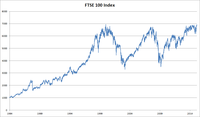
Photo from wikipedia
PurposeThe study seeks to differentiate informal firms with high-growth prospects by their resource acquisition acts and to improve identification of growth-oriented informal firms for effective design and targeting of support… Click to show full abstract
PurposeThe study seeks to differentiate informal firms with high-growth prospects by their resource acquisition acts and to improve identification of growth-oriented informal firms for effective design and targeting of support measures.Design/methodology/approachAn original set of firm-level data was collected using face-to-face survey in Lusaka, Zambia. Six clearly defined criteria were used to sample informal firms, apart from general informal business. Regression analyses were conducted to test the association of different resource acquisition acts with two growth dimensions: number of employees and business earnings of the 325 informal firms sampled.FindingsAccessing clientele beyond local market, linking up with formal businesses and acquiring information and knowledge via online sources were found influential to growth in business earnings. Surprising, acquisition of finance and skills showed no effect. Employment expansion, though widely used, may not be a stable indicator of informal firm growth.Research limitations/implicationsThe study highlights the relevance of the emerging entrepreneurship perspective to understanding the topic. It cautions against pre-setting a size threshold for sampling informal firms and against relying on employment expansion as the sole proxy of growth.Practical implicationsThe findings prompt a rethink of the effectiveness of conventional support programmes to drive growth of informal firms such as funding and training. Directing support measures to target growth-oriented informal firms will lead to creation of decent and sustainable jobs and formalisation.Originality/valueWith an original firm-level dataset, the study challenges a long-held assumption that growth of informal firm is negligible and shows that segments of informal firms are sustainable and could attain significant growth and derives new insights into researching and supporting informal firm growth.
Journal Title: Journal of Small Business and Enterprise Development
Year Published: 2021
Link to full text (if available)
Share on Social Media: Sign Up to like & get
recommendations!